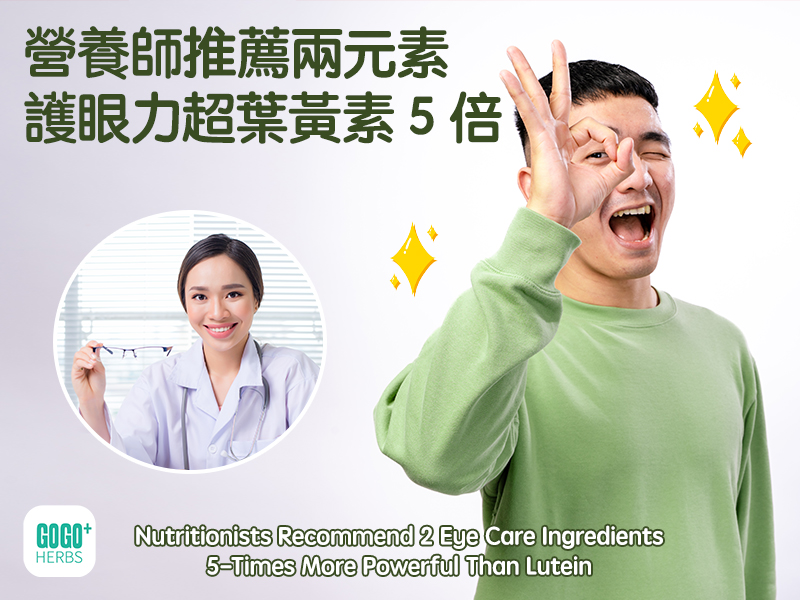With daily use of electronic devices becoming commonplace in modern life, many people carry lutein supplements while working, hoping to alleviate eye strain. However, nutritionist Zhang Tongfen points out that for better eye protection, supplementing with astaxanthin and blackcurrant anthocyanins is more ideal than supplementing with lutein alone.
When it comes to eye health supplements, most people immediately think of lutein. In fact, lutein's main function is to prevent blue light damage to the macula and reduce the risk of macular degeneration, but it has no immediate effect on eye health.Relieve eye fatigueLutein does not have a rapid effect; what can truly and effectively improve fatigue are astaxanthin and blackcurrant.
Zhang Tongfen explained that astaxanthin is a powerful antioxidant, not only 5 to 10 times more protective than lutein against the macula, but more importantly, it can...Soothe the ciliary muscles of the eyesIt relieves fatigue, helps relax muscles, and has anti-inflammatory effects. "Research from Fujita Health University in Japan further confirms that daily intake of 4 mg of astaxanthin can effectively alleviate eye discomfort accumulated from prolonged use of electronic devices. However, unlike lutein, which accumulates and stores in the eyes, astaxanthin needs to be replenished regularly every day to maintain its effects." Furthermore, although astaxanthin is often extracted from shrimp, seaweed is also an important source; vegetarians can avoid consuming astaxanthin from animal sources by simply paying attention to the ingredient sources listed on the product label.
As for blackcurrants, as a nutrient-rich berry, they are rich in anthocyanins and vitamin C, and have excellent antioxidant capabilities. Besides slowing down lens degeneration, blackcurrants, like astaxanthin, can quickly relieve eye fatigue and promote blood circulation in the eyes, with an eye-protecting effect approximately five times that of lutein. Zhang Tongfen suggests that for immediate supplementation, liquid blackcurrant supplements are a good choice, as these products have higher nutrient absorption efficiency.
With the arrival of summer vacation, the use of 3C products has entered its peak season, and some mobile phone software has launched a "black screen mode," claiming that it can be used at night.Protect your eyesHowever, Dr. Chen Ying-shan, director of the Department of Computer Science at China Medical University Hsinchu Hospital, cautioned that excessively low screen brightness can lead to color distortion and tonal deviation, which in turn increases the burden on the eyes and further causes fatigue. He suggested three steps to reduce screen brightness in the summer.Preventing vision degenerationProtect your eye health.
The first step is "getting enough rest." Chen Yingshan suggests that elementary school students should not use 3C products for more than 20 minutes a day; junior high school students should limit it to 1 hour, and take a 10-minute break every 20 minutes; high school students can extend this to 10 minutes every 30 minutes; university students until the onset of presbyopia can adjust to 10 minutes every 40 minutes; once presbyopia symptoms appear, the rhythm of 10 minutes every 30 minutes should be restored to avoid excessive eye strain.
The second step is "to protect yourself from the sun." Ultraviolet rays in sunlight are extremely harmful to the eyes. When outdoors, wear photochromic lenses or sunglasses to reduce direct exposure to ultraviolet rays. Chen Yingshan emphasized that the intensity of blue light in sunlight is thousands of times greater than that of blue light from a mobile phone. Just 15 minutes of exposure to sunlight causes almost the same amount of blue light stimulation to the eyes as the cumulative effect of prolonged mobile phone use throughout the day, highlighting the importance of outdoor sun protection.
The third step is "balanced nutrition." In your daily diet, eating one egg and consuming plenty of dark green vegetables can provide sufficient lutein; eating more seaweed can provide astaxanthin. If you choose to purchase nutritional supplements, pay attention to the content of the active ingredients: the recommended daily intake of lutein is 10 mg, and astaxanthin is 4 mg; only by meeting these dosages can you achieve the ideal eye protection effect.


